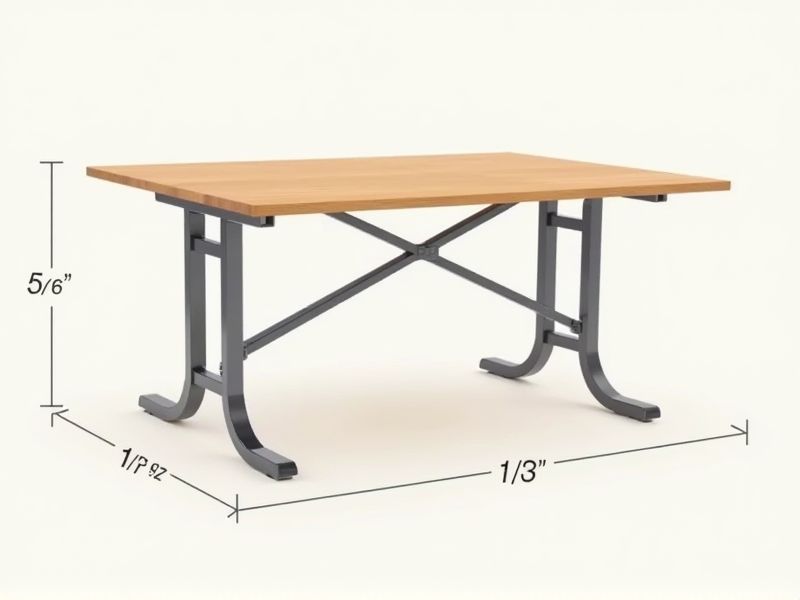
When selecting a folding table, knowing the standard dimensions can help ensure it fits your space and meets your needs. Most rectangular folding tables commonly measure 6 feet (72 inches) or 8 feet (96 inches) in length, with widths typically around 30 inches. Round folding tables often come in diameters of 48 inches or 60 inches. Always check the table's height as well--most standard folding tables stand at about 29 to 30 inches tall, which is comfortable for both dining and working arrangements.
Length Options
Folding tables typically come in various lengths, ranging from 4 feet (48 inches) to 8 feet (96 inches). A 6-foot folding table is among the most popular choices for events, providing ample space for up to 6 to 8 people seated comfortably. When selecting a folding table, consider the intended use: a 4-foot option is ideal for small gatherings, while an 8-foot table is suitable for large events or banquet settings. Your choice of length can significantly impact seating arrangements and overall functionality, making it essential to assess your needs before purchasing.
Width Variations
Folding tables typically exhibit width variations ranging from 24 to 72 inches, accommodating diverse space requirements for events or gatherings. A standard width of 30 inches is common for many models, providing a balance between usability and compactness. When selecting your folding table, consider the intended use; for example, a 48-inch table can seat four adults comfortably, while a 60-inch table effectively serves six. Additionally, width influences stability, with wider tables generally offering enhanced sturdiness during use.
Height Adjustments
The height adjustments for folding tables typically range from 28 to 36 inches, accommodating various user needs and preferences. Tables with adjustable legs provide versatility for different activities, whether for dining or working. Many models feature a simple push-button mechanism or a locking pin system that ensures stability once the desired height is set. Investing in a folding table with customizable height options enhances comfort and usability for gatherings, workshops, or outdoor events.
Weight Capacity
The standard weight capacity of a folding table typically ranges from 250 to 500 pounds, depending on the materials used and the design. For instance, commercial-grade tables often have a higher weight capacity, supporting around 1,000 pounds, suitable for heavy-duty tasks. When selecting a table, you should consider both the intended use and the number of people it will accommodate, as weight distribution is crucial for stability. Pay attention to specifications provided by manufacturers to ensure safety and durability for your specific needs.
Material Type
When selecting a folding table, the material type significantly impacts its durability, weight capacity, and aesthetic appeal. High-density polyethylene (HDPE) is a popular choice for its lightweight nature and resistance to stains and cracks, making it ideal for outdoor use. Aluminum tables offer excellent portability with a sleek design, while traditional wood tables provide a classic look and enhanced stability for indoor settings. Understanding the strengths and weaknesses of each material can help you choose the perfect folding table for your needs, ensuring it meets both functional and aesthetic requirements.
Foldability Features
Foldability features of standard folding tables include lightweight materials, typically weighing between 15 to 30 pounds, making them easy to transport and store. Most models feature mechanisms that allow for quick and effortless folding, often facilitated by a simple latch or hinge system for enhanced convenience. The compactness achieved when folded can reduce the table's dimensions to a mere few inches in thickness, enabling it to fit into tight storage spaces. Many folding tables also incorporate durable surfaces, such as high-density polyethylene or metal, ensuring longevity while maintaining ease of use.
Locking Mechanisms
Locking mechanisms in folding tables are crucial for ensuring stability and safety during use. High-quality models often utilize steel locking systems that secure the tabletop in place, preventing accidental collapses; some even feature dual locks for enhanced security. Consider tables with a weight capacity of up to 1,000 pounds, as they provide greater durability for heavy items. When choosing a folding table, prioritize those with user-friendly locking mechanisms that allow for easy setup and breakdown without compromising structural integrity.
Edge Designs
The standard of folding tables today emphasizes innovative edge designs that enhance both aesthetics and functionality. Rounded edges, for instance, minimize injury risks, making them ideal for busy environments, while sleek, straight edges promote a modern look. Many contemporary models are constructed with high-quality materials, ensuring durability and resistance to wear, with some even featuring weatherproof finishes for outdoor use. When selecting a folding table, consider how the edge design contributes to both safety and the overall style of your space.
Storage Capacity
The storage capacity of a folding table is crucial for efficiency and convenience, often ranging from 200 to 1,000 pounds, depending on design and materials. For example, high-quality plastic or metal folding tables can typically support around 300 to 600 pounds, making them suitable for various uses. When fully folded, many models achieve a compact profile, taking up only 6 to 8 inches of depth, allowing you to easily store them in closets or beneath beds. Consider features like easy-lock mechanisms and lightweight frames, which enhance portability without compromising storage efficiency.
Stability Enhancers
Stability enhancers in folding tables typically include features such as reinforced frames, non-slip feet, and locking mechanisms, which ensure a secure and steady surface during use. Many models offer weight capacities ranging from 300 to 1,000 pounds, accommodating diverse needs from casual dining to heavy-duty work. The integration of high-quality materials like steel and durable plastic contributes to a table's overall lifespan and reliability, making them suitable for events or outdoor activities. By prioritizing stability, you can confidently choose a folding table that withstands pressure and usage over time.
